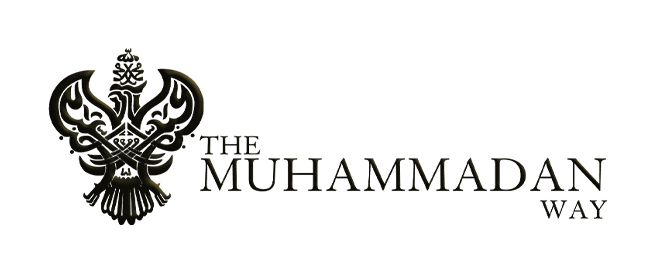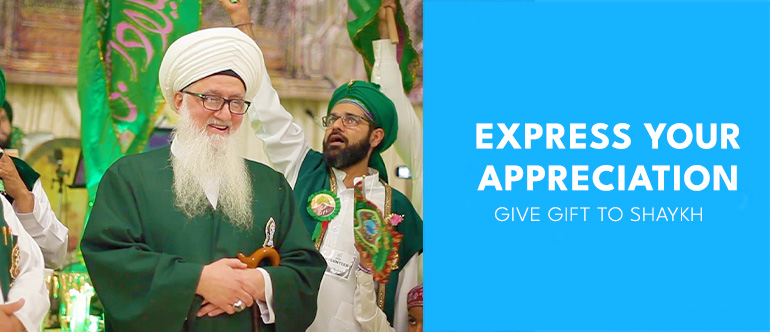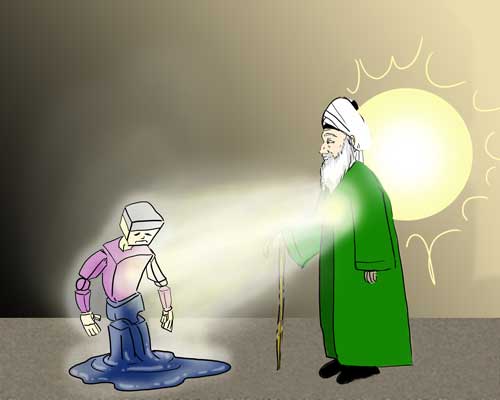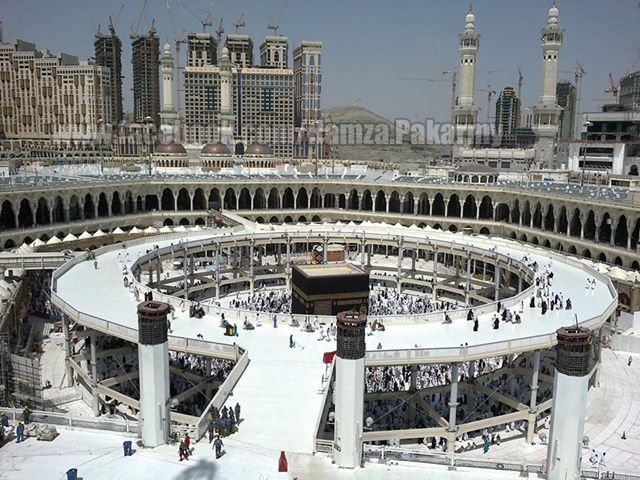
Three Tests that reflected the life of Musa (as)
Three Tests that Reflected the life of Musa (as)
Story of Musa (as) and Khidr (as)
From the Realities of Mawlana Shaykh Hisham Kabbani (Q) as taught by Shaykh Nurjan Mirahmadi.
A’udhu Billahi Minash Shaitanir Rajeem
Bismillahir Rahmanir Raheem
I seek refuge in Allah from Satan, the rejected one
In the Name of Allah, the Most Beneficent, the Most Merciful
We share from our understanding of their teachings; the oceans that are coming from the heart of prophet (saws) to Sultanul Awliya to Mawlana Shaykh Hisham. We are filled from just a drop of those realities. They teach us from the holy Quran, that the ocean of holy Quran is filled with oceans of every imaginable reality but, requires tafakkur and contemplation.
Musa (as) wanted More Knowledge
One instance for us to understand especially for the people of realities, is the story of Sayyidina Musa (as). From whatever was opening and in the events within his life (as); he wanted from the knowledge that he was beginning to witness. When he asked Allah (aj) let me to see you. What was shown to Nabi Musa (as) was enough for Nabi Musa (as) to know that the knowledge that he has is not the infinite knowledge; that there must be more. There is always above every knower a knower of Allah (aj);
the story of Sayyidina Musa (as). From whatever was opening and in the events within his life (as); he wanted from the knowledge that he was beginning to witness. When he asked Allah (aj) let me to see you. What was shown to Nabi Musa (as) was enough for Nabi Musa (as) to know that the knowledge that he has is not the infinite knowledge; that there must be more. There is always above every knower a knower of Allah (aj);
نَرْفَعُ دَرَجَاتٍ مَّن نَّشَاءُ ۗ وَفَوْقَ كُلِّ ذِي عِلْمٍ عَلِيمٌ ﴿٧٦﴾
12:76 – “…Narfa’u darajatin man nashao, Wa fawqa kulli dhee ‘ilmin ‘aleem.” (Surat Yusuf)
“… We raise in degrees whom We will, and Above every knower there is a greater knower.”[Holy Quran, Joseph 12:76].
As Allah (aj) is al Khaliq (the Creator), is ever expanding creation. Allah (aj) is al’Aleem (the All knowing). He is the one bestowing knowledge and that ocean is never ending. There is no beginning and no end to its reality.
On that journey, what is important is that Nabi Musa (as) took himself to where the two rivers meet.
وَإِذْ قَالَ مُوسَىٰ لِفَتَاهُ لَا أَبْرَحُ حَتَّىٰ أَبْلُغَ مَجْمَعَ الْبَحْرَيْنِ أَوْ أَمْضِيَ حُقُبًا ﴿٦٠﴾
18:60 – “Wa idh qala moosa lifatahu laa abrahu hatta ablugha majma’a albahrayni aw amdiya huquba.” (Surat al Kahf)
“And [mention] when Moses said to his servant, “I will not cease [traveling] until I reach the junction of the two seas or continue for a long period.” (The Cave 18:60)
It means when we read and we read fast, we are not contemplating. But Alhamdullelah with the love of Awliyaullah (saints), we begin to read and they teach us to stop.
Sign for Musa (as) is that Dead Fish Came to Life
When you get to the understanding of when Nabi Musa (as) is with his helper, Joshua and they are going for the realities. They are walking and Nabi Musa (as) asked “what happened?”
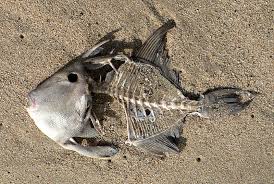 قَالَ أَرَأَيْتَ إِذْ أَوَيْنَا إِلَى الصَّخْرَةِ فَإِنِّي نَسِيتُ الْحُوتَ وَمَا أَنسَانِيهُ إِلَّا الشَّيْطَانُ أَنْ أَذْكُرَهُ ۚوَاتَّخَذَ سَبِيلَهُ فِي الْبَحْرِ عَجَبًا ﴿٦٣﴾
قَالَ أَرَأَيْتَ إِذْ أَوَيْنَا إِلَى الصَّخْرَةِ فَإِنِّي نَسِيتُ الْحُوتَ وَمَا أَنسَانِيهُ إِلَّا الشَّيْطَانُ أَنْ أَذْكُرَهُ ۚوَاتَّخَذَ سَبِيلَهُ فِي الْبَحْرِ عَجَبًا ﴿٦٣﴾
18:63 – “Qala araayta idh awayna ilas sakhrati fa-innee naseetu alhoota wa ma ansaneehu illash shaytanu an adhkurahu, wat takhadha sabeela hu fee al bahri ‘ajaba. (Surat Al-Kahf)
He said, “Did you see when we retired to the rock? Indeed, I forgot [there] the fish. And none made me forget it except Satan – that I should mention it. And it took its course into the sea amazingly”. (Holy Quran, The Cave 18:63)
Joshua (Yusha ibn Nun) says, “I forgot to tell you, we pass something and it was miraculous.” That event in itself is tremendously important. They had a dry fish to eat. Musa (as) stops and asks “what happened?” Joshua said “the fish that we were going to eat, in the place that we were suppose to meet, it came alive.”
You pass it like it is a small instance. You go to the next ayat (verse) and go to the next ayat. Allah (aj) says it requires tafakkur (contemplation). The men of understanding have tafakkur and contemplation. That every 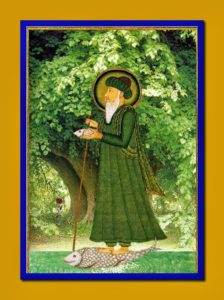 ayat draws their attention; when Allah (aj) wants to teach something from it. Every ayat has oceans of knowledge within it.
ayat draws their attention; when Allah (aj) wants to teach something from it. Every ayat has oceans of knowledge within it.
They are going and the sign of his location is that the dead will come to life. It’s not small. It’s not like you will go and you will see holy people and something will happen. He is moving and the fish he wants to eat comes to life. It’s a big sign for him that this is not an ordinary location and ordinary servant that you are about to meet. Allah (aj) is giving you a sign that the dead fish you are going to eat is coming to life.
Our souls in this dunya are as if we are dead. No Hayat, it’s just the hayat (life) of dunya.
Awliyaullah (Saints) are Allah’s Mercy
The association of people of knowledge whom Allah (aj) describes Sayyidina Khidr (as). He attained a Rahma (mercy) and then we give them ‘Ilm laduni(Heavenly Knowledge).
فَوَجَدَا عَبْدًا مِّنْ عِبَادِنَا آتَيْنَاهُ رَحْمَةً مِّنْ عِندِنَا وَعَلَّمْنَاهُ مِن لَّدُنَّا عِلْمًا ﴿٦٥﴾
18:65 – “Fawajada ‘abdan min ‘ibadinaa ataynahu rahmatan min ‘indina wa ‘allamnahu mil ladunna ‘ilma” (Surat al Kahf)
“And they found a servant from among Our servants to whom we had given mercy from us and had taught him from Us a [certain] knowledge.” (Holy Quran, The Cave 18:65)
In this world everyone studies first hoping to get the rahma (mercy). As soon as they study, they become very hard and no rahma opens within their heart. Allah (aj) says it is the reverse. For the men of understanding and he is one of my Rijal. There are many of those rijals (men of God). 124,000 Awliyaullah must be on this earth at every moment. One dies, another one comes. Allah (aj) describes their characteristics that they attained rahma. And ‘Rahmatal Lil’alameen’ (Mercy to Creation), is Sayyidina Muhammad (saws).
وَمَا أَرْسَلْنَاكَ إِلَّا رَحْمَةً لِّلْعَالَمِينَ ١٠٧
21:107 – “Wa maa arsalnaka illa Rahmatan lil’alameen.” (Surat Al Anbiya)
“And We have not sent you, [O Muhammad], except as a mercy to the worlds.” (Holy Quran, The Prophets 21:107)
It means they have proximity and a love and closeness to Muhammad (saws). How Allah gives it? Allah gives it. As a result of that love, we gave him ‘Ilm Laduni, heavenly knowledge; not accounting, psychology or medicine. But we gave him divinely knowledge from our divinely oceans.
Then everything about manners and adab begin to open into that dialogue because it is from surat ul Kahf (chapter of the Cave). These verses that we are interested in are from the surat ul Kahf because the ashab e Kahf (the people of the Cave) is the reality of all the lovers of Sayyidina Muhammad (saws). They should be running from Shayateen (devils) and Pharaonic government to that cave of safety. Allah (aj) says for a chance that I may shower you from that rahma (mercy). But you have to run from Shaytan (Satan) into the cave.
وَإِذِ اعْتَزَلْتُمُوهُمْ وَمَا يَعْبُدُونَ إِلَّا اللَّـهَ فَأْوُوا إِلَى الْكَهْفِ يَنشُرْ لَكُمْ رَبُّكُم مِّن رَّحْمَتِهِ وَيُهَيِّئْ لَكُم مِّنْ أَمْرِكُم مِّرْفَقًا ﴿١٦﴾
18:16 – “Wa idhi’ tazaltumo hum wa ma ya’budoona illAllaha fawoo ilal kahfi yanshur lakum rabbukum mir rahmatihi wa yuhayyi lakum min amrikum mirfaqa.” (Surat al Kahf )
[The youths said to one another], “And when you have withdrawn from them and that which they worship other than Allah, retreat to the cave. Your Lord will spread out for you of His mercy and will prepare for you from your affair facility.” (Holy Quran, The Cave)
We All Need a Spiritual Guide
Within that surat al Kahf (the Cave), Allah (aj) describing now the akhlaq (manners) and the character, because Kalimullah and gives to the highest standard. The one who is Kalimullah (The one who speaks to Allah – Musa (as)) most definitely thinks he knows everything. He speaks to Allah (aj)! He doesn’t need an intercessor. He doesn’t need even an angel. This is a sign for the people who are denying that you need somebody, that you need an intercession, that you need companionship.
Musa (as) is Kalimullah and says that the knowledge that I am seeking ya rabbi (O’ my lord), I understood is not with me. Allah (aj) says, you understood clearly correct. I am going to send you one of my students, one of my rijal. Not a whole association of the rijals (men of God). One of the rijal assigned for you is your dead fish came to life.
What was the first thing Sayyidina Musa (as) asked Sayyidina Khidr (as)? Let me to be your student.
قَالَ لَهُ مُوسَىٰ هَلْ أَتَّبِعُكَ عَلَىٰ أَن تُعَلِّمَنِ مِمَّا عُلِّمْتَ رُشْدًا ﴿٦٦﴾
18:66 – “Qala lahu moosa hal attabi’uka ‘alaa an tu’allimani mimma ‘ullimta rushda.” (Surat al Kahf)
“Moses said to him, “May I follow you on [the condition] that you teach me from what you have been taught of sound judgement? (The Cave 18:66)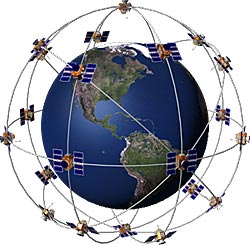
{Global Positioning Shaykhs} GPS From the tabi’yeen (obedience), it means the ‘itebah (obey). He immediately said ” let me to follow you.” Not that I am just going to hang out with you and I am still going to be the prophet and you are still going to be who you are. He acknowledged the relationship that let me to follow you like a student. From the reality of ‘itebah (obedience), that I will be obedient to you and follow you. That you are the one with the knowledge and I am the one seeking that knowledge.
You have No Patience with the Knowledge You Don’t Have
The dialogue of next Ayat describes the whole problem of trying to seek a teacher and to seek the people of the realities.
قَالَ إِنَّكَ لَن تَسْتَطِيعَ مَعِيَ صَبْرًا ﴿٦٧
18:67 – “Qala innaka lan tastatee’a ma’iya sabra. (Surat Al Kahf)
He said, “Indeed, with me you will never be able to have patience.” (Holy Quran, The Cave)
Sayyidina Khidr (as) is telling Kalimullah who speaks to Allah directly, that you won’t have patience with the knowledge that you don’t know. Ajeeb (strange)! He is kalimullah, if it’s a knowledge he doesn’t know, he could clearly ask. But, Sayyidina Khidr (as) is defining now the characteristics of adab and mannerism.
وَكَيْفَ تَصْبِرُ عَلَىٰ مَا لَمْ تُحِطْ بِهِ خُبْرًا ﴿٦٨﴾
18:68 – “Wa kayfa tasbiru ‘ala ma lam tuhit bihi khubra. (Surat alKahf)
“And how can you have patience for what you do not encompass in knowledge?” (The Cave 18:68)
He says “you won’t be patient with me for the knowledge that you don’t know.” Because I know that you think you know a lot. But, as soon as you accompany me, you won’t be patient for the knowledge that you don’t know and Allah (aj) has not bestowed upon you.
All the schools of akhlaq (manners) and all the tariqas (Sufi paths) have a position for Sayyidina Khidr (as) in their shajara (tree) because, he is inter-dimensional reality. He is not dead, he is alive. He is teaching within this dimension; linking unseen with the seen. He is bringing realities from the unseen into the seen. Through the Owaisi connection, many awliya ullah (saints) have connection to Sayyidina Khidr (as) for knowledge. With their shaykhs and visited by Sayyidina Khidr (as) for conveyance of knowledge. But teaching the dialogue and emphasize of that dialogue is that you won’t have patience for the knowledge that you don’t understand.
قَالَ سَتَجِدُنِي إِن شَاءَ اللَّـهُ صَابِرًا وَلَا أَعْصِي لَكَ أَمْرًا ﴿٦٩﴾
18:69 – “Qala satajidunee in shaa Allahu sabiran wa la a’see laka amra.” (Surat al Kahf)
[Moses] said, “You will find me, if Allah wills, patient, and I will not disobey you in [any] order.” (The Cave 18:69)
Sayyidina Musa (as) said “no, no” He is now clarifying the characteristics, “I will be patient with you. Allow me to accompany you.”
Keep the path of Silence
قَالَ فَإِنِ اتَّبَعْتَنِي فَلَا تَسْأَلْنِي عَن شَيْءٍ حَتَّىٰ أُحْدِثَ لَكَ مِنْهُ ذِكْرًا ﴿٧٠﴾
18:70 – “Qala fa-ini ittaba’tanee fala tasalnee ‘an shay-in hatta ohditha laka minhu dhikra.” (Surat al Kahf)
[Khidr] He said, “Then if you follow me, do not ask me about anything until I make to you about it mention.” (The Cave 18:70)
It means the whole ocean of adab  (manners/etiquette) begins to open for us to understand. To absorb this reality, you have to keep a path of silence. You have to keep a path of good manners. You have to keep a path of saying I don’t know, I don’t know, I don’t know and I am going to accompany until Allah (aj) opens my heart to know the wisdom of it.
(manners/etiquette) begins to open for us to understand. To absorb this reality, you have to keep a path of silence. You have to keep a path of good manners. You have to keep a path of saying I don’t know, I don’t know, I don’t know and I am going to accompany until Allah (aj) opens my heart to know the wisdom of it.
Subhanaka Allahuma ya Rabbi (Glory be to you Allah, O my Lord) that what He showed Sayyidina Musa (as) was related to Sayyidina Musa (as)’s life and he didn’t see it. He (as) just complained the whole way about it. We are nothing compared to Nabi Musa (as) but, Nabi Musa (as) is allowing the dialogue in that interaction as a reality for the people of haqayiq (truth). He says “use my example in life to teach the way of realities.” That the teacher is teaching, even how great the student is, you are not going to have patience for the knowledge that you don’t understand.
The Three Tests of Nabi Musa (as)
We are going quickly into it; we don’t have to go through all the examples and tests in detail.
- He (Khidr (as)) goes to a boat, sinks the ship
- He (Khidr (as)) goes to a child, make him zabiha (sacrifice)
- He (Khidr (as)) goes to a wall, and rebuilds the wall
1. First Test – Sinking Ship
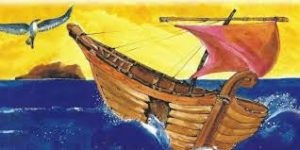 فَانطَلَقَا حَتَّىٰ إِذَا رَكِبَا فِي السَّفِينَةِ خَرَقَهَا ۖ قَالَ أَخَرَقْتَهَا لِتُغْرِقَ أَهْلَهَا لَقَدْ جِئْتَ شَيْئًا إِمْرًا ﴿٧١
فَانطَلَقَا حَتَّىٰ إِذَا رَكِبَا فِي السَّفِينَةِ خَرَقَهَا ۖ قَالَ أَخَرَقْتَهَا لِتُغْرِقَ أَهْلَهَا لَقَدْ جِئْتَ شَيْئًا إِمْرًا ﴿٧١
18:71 -“Fantalaqa hatta idha rakiba fes safeenati kharaqaha, qala akharaqtaha litughriqa ahlaha laqad jita shay-an imra.” (Surat al Kahf)
“So they set out, until when they had embarked on the ship, alKhidhr tore it open. [Moses] said, “Have you torn it open to drown its people? You have certainly done a grave thing.” (The Cave 18:71)
2.Second Test – The Boy
فَانطَلَقَا حَتَّىٰ إِذَا لَقِيَا غُلَامًا فَقَتَلَهُ قَالَ أَقَتَلْتَ نَفْسًا زَكِيَّةً بِغَيْرِ نَفْسٍ لَّقَدْ جِئْتَ شَيْئًا نُّكْرًا ﴿٧٤﴾
18:74 – “Fantalaqa hatta idha laqiya ghulaman faqatalahu qala aqatalta nafsan zakiyatan bighayri nafsin laqad jita shay-an nukra.” (Surat al Kahf)
“So they set out, until when they met a boy, alKhidhr killed him.
[Moses] said, “Have you killed a pure soul for other than [having killed] a soul? You have certainly done a deplorable thing.” (The Cave, 18:74)
3. Third Test – Building the Wall
فَانطَلَقَا حَتَّىٰ إِذَا أَتَيَا أَهْلَ قَرْيَةٍ اسْتَطْعَمَا أَهْلَهَا فَأَبَوْا أَن يُضَيِّفُوهُمَا فَوَجَدَا فِيهَا جِدَارًا يُرِيدُ أَن يَنقَضَّ فَأَقَامَهُ ۖ قَالَ لَوْ شِئْتَ لَاتَّخَذْتَ عَلَيْهِ أَجْرًا ﴿٧٧
“Fantalaqa hatta idha ataya ahla qaryatin istat’ama ahlaha faabaw an yudayyifoo huma fawajada feeha jidaran yureedu an yanqadda faaqamahu, qala law sheta lat takhadhta ‘alayhi ajra.”
“So they set out, until when they came to the people of a town, they asked its people for food, but they refused to offer them hospitality. And they found therein a wall about to collapse, so alKhidhr restored it.
[Moses] said, “If you wished, you could have taken for it a payment.”
Each way Nabi Musa (as) is in an argument, each way Nabi Musa (as) is complaining and saying “it’s not right”
- Why did you sink the ship? We shouldn’t have done that.
- Why did you take that child? We shouldn’t have done that.
- Why did you build the wall, when we could have asked a fee? We shouldn’t have done that. I was tired and hungry.
The Interpretations of the Three Tests
قَالَ هَـٰذَا فِرَاقُ بَيْنِي وَبَيْنِكَ ۚ سَأُنَبِّئُكَ بِتَأْوِيلِ مَا لَمْ تَسْتَطِع عَّلَيْهِ صَبْرًا ﴿٧٨﴾
18:78 – “Qala hadha firaqu baynee wa baynika, saonabbioka bitaweeli ma lam tastati’ ‘alayhi sabra. (Surat Al Kahf 18:78)
[Al-Khidhr] said, “This is parting between me and you. I will inform you of the interpretation of that about which you could not have patience. (The Cave 18:78)
1. First Test – Ship was Saved from Tyrant King
- أَمَّا السَّفِينَةُ فَكَانَتْ لِمَسَاكِينَ يَعْمَلُونَ فِي الْبَحْرِ فَأَرَدتُّ أَنْ أَعِيبَهَا وَكَانَ وَرَاءَهُم مَّلِكٌ يَأْخُذُ كُلَّ سَفِينَةٍ غَصْبًا ﴿٧٩
18:79 – “Amma assafeenatu fakanat limasakeena ya’maloona fee albahri faarattu an a’ebaha wa kana wa ra-ahum malikun ya khudhu kulla safeenatin ghasba.” (Surat al Kahf)
“As for the ship, it belonged to poor people working at sea. So I intended to cause defect in it as there was after them a king who seized every [good] ship by force.” (The Cave 18:79)
2. Second Test – The Boy would bring Hardship to Parents
وَأَمَّا الْغُلَامُ فَكَانَ أَبَوَاهُ مُؤْمِنَيْنِ فَخَشِينَا أَن يُرْهِقَهُمَا طُغْيَانًا وَكُفْرًا ﴿٨٠﴾
فَأَرَدْنَا أَن يُبْدِلَهُمَا رَبُّهُمَا خَيْرًا مِّنْهُ زَكَاةً وَأَقْرَبَ رُحْمًا ﴿ ٨١﴾
18:80-81 – ““Wa amma alghulamu fakana abawahu muminayni fakhasheena an yurhiqahuma tughyanan wa kufra. (80) Faaradna an yubdi lahuma rabbuhuma khayram minhu zakatan wa aqraba ruhma. (81)” (Surat Kahf)
“And as for the boy, his parents were believers, and we feared that he would overburden them by transgression and disbelief. (80) So we intended that their Lord should substitute for them one better than him in purity and nearer to mercy. (81) (Holy Quran, The Cave 18:80-81)
3. Third Test- Wall was build to Cover Treasure of Orphans
وَأَمَّا الْجِدَارُ فَكَانَ لِغُلَامَيْنِ يَتِيمَيْنِ فِي الْمَدِينَةِ وَكَانَ تَحْتَهُ كَنزٌ لَّهُمَا وَكَانَ أَبُوهُمَا صَالِحًا فَأَرَادَ رَبُّكَ أَن يَبْلُغَا أَشُدَّهُمَا وَيَسْتَخْرِجَا كَنزَهُمَا رَحْمَةً مِّن رَّبِّكَ ۚ وَمَا فَعَلْتُهُ عَنْ أَمْرِي ۚ ذَٰلِكَ تَأْوِيلُ مَا لَمْ تَسْطِع عَّلَيْهِ صَبْرًا ﴿٨٢
18:82 -“Wa amma aljidaru fakana lighulamayni yateemayni fee almadeenati wa kana tahtahu kanzun lahuma wa kana abohuma salihan faarada rabbuka an yablugha ashudda huma wa yastakhrija kanza huma rahmatan min rabbika, wa ma fa’altuhu ‘an amree, dhalika taweelu ma lam tasti’ ‘alayhi sabra.” (Surat al Kahf)
“And as for the wall, it belonged to two orphan boys in the city, and there was beneath it a treasure for them, and their father had been righteous. So your Lord intended that they reach maturity and extract their treasure, as a mercy from your Lord. And I did it not of my own accord. That is the interpretation of that about which you could not have patience.” (The Cave 18:82)
The Realities of the three tests in Tariqa (Spiritual Path)
The reality of those three are deep within tariqa (Islamic Spiritual path).
1. The boat is the sustenance
That Allah (aj) gives permission to the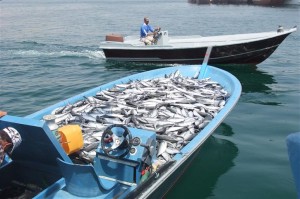 Shaykhs to lower your sustenance. Didn’t destroy the boat, put a hole in it. Why? Because Shaytan (Satan) is coming to take your ability, take your trade, take what you are capable of doing it and making it in the use Shaytan. He knows that Shaytan is coming for this boat. For this fisher man, his rizq (sustanence) will be in the hand of Shaytan. Let us sink the boat until Allah (aj) is finished training him.
Shaykhs to lower your sustenance. Didn’t destroy the boat, put a hole in it. Why? Because Shaytan (Satan) is coming to take your ability, take your trade, take what you are capable of doing it and making it in the use Shaytan. He knows that Shaytan is coming for this boat. For this fisher man, his rizq (sustanence) will be in the hand of Shaytan. Let us sink the boat until Allah (aj) is finished training him.
2. Destroy the Bad Character
The killing of the boy was the wild character. That boy’s wild character will destroy the family. Allah (aj) will send something new.
3. The Wall – Protect the Treasure of the Soul
The father of the two orphans was a pious man and left these yateem (orphans) a treasure for them to inherit. There is a time in which they will inherit that treasure. As Allah (aj) has set aside a treasure within our soul. One of Prophet Muhammad (saws) name is Abul Arwah, that he is the father of the souls. He (saws) considers all the souls like yateem (orphans). They have lost their connection with Allah (as). They have lost themselves in dunya (material world). Prophet (saws) is sensitive to the needs of the yateem. That he (saws) will intercede for them and bring them towards the treasure in which Allah (aj) has bestowed upon them.
How the Three Tests Reflected the Life of Musa (as)
The whole way Nabi Musa (as) was complaining. At the end, Mawlana Shaykh (Hisham) begins to describe that Sayyidina Khidr didn’t understand that why are you [Nabi Musa (as)] complaining about…
1. Musa (as)’s mom threw him in a basket
The boat that we put a hole in it, when your mom threw you in a basket. Because now the Shaykh is beginning to teach that what you are complaining about, it exists within you. But if you don’t stay silent to learn and to take the path, you will never grow and you will never reach ‘ilm laduni (heavenly knowledge). You want to reach the path that Allah (aj) has put aside for you. Because the bad characters come to fight and to argue until you are kicked out of the school. Then another student comes. Allah (aj) has millions of them but limited chairs for that reality.
Khidr (as) told Nabi Musa (as), that which was his own life and he is not 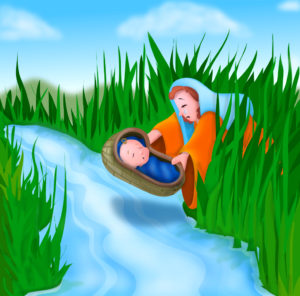 seeing it. “Why you are doing that to the boat”. At the end Khidr (as) said “Why your mom threw you in a basket in the water?” At that time he realized by the means of that basket, he was saved and put in the hands of Faraon (Pharaoh). Why didn’t he see it at that time when he was arguing? Because Allah (aj) wanted the best of akhlaq (manners) and character; keep silent. I will teach you if you have faith. You asked me to reach towards realities and I am sending you to the path of realities. Then how dare you talk, how dare you complain, how dare you even show yourself. Stay silent! These rijals are authorized by Allah (aj). They attained the rahma and we have given them heavenly knowledge.
seeing it. “Why you are doing that to the boat”. At the end Khidr (as) said “Why your mom threw you in a basket in the water?” At that time he realized by the means of that basket, he was saved and put in the hands of Faraon (Pharaoh). Why didn’t he see it at that time when he was arguing? Because Allah (aj) wanted the best of akhlaq (manners) and character; keep silent. I will teach you if you have faith. You asked me to reach towards realities and I am sending you to the path of realities. Then how dare you talk, how dare you complain, how dare you even show yourself. Stay silent! These rijals are authorized by Allah (aj). They attained the rahma and we have given them heavenly knowledge.
The bad characteristic come back and says you don’t recite perfectly. You don’t do this perfectly. Because the character, our ego wants to find everything possibly wrong with that rijal (man of God). Because we have jelousy and hasad (jelousy). We think we are the rijal, why he should be the rijal? He doesn’t even recite correctly. He doesn’t do this correctly. He doesn’t do that correctly. We find all of the problems and already the relationship is broken.
It means Nabi Musa (as) was really coming to get the knowledge. Then in an instant he found something wrong with it. That’s why ummat (nation) of Muhammad (saws) is so far beyond in its reality. The Sahabi (companions of Muhammad (saws)) never complained and they never argued with prophet (saws). Their language was sami’na wa ata’na (We heard and we obey). You see it, we heard it, it’s finished! We are by your side. They weren’t from the nation that argued and quarrelled about everything and said, proof it, proof it!
2.Musa (as) Hit a Man who accidently Died
Then Musa (as) said “why did you hit the boy and made him pass away?” Khidr (as) said, “Ya Musa, why did you hit the slave who was beating your people and he died from your touch?” That is one of the reasons that Nabi Musa (as) can’t make intercession in the Day of Judgement.
The one who is ma’soom (infallible), in Allah’s eyes that has no sin is Sayyidina Muhammad (saws). All the prophets have something in their book, that the completeness of their intercession. They won’t. They say I have issues in my kitab (book), let us go to Sayyidina Muhammad (saws) for intercession. This is the grand intercession on the Day of Judgment.
Nabi Musa (as) is allowing us to understand. He (as) says, I didn’t see that issue, I didn’t see that I had hit somebody and he died. And now I am judging Sayyidina Khidr (as) on his work for Allah (aj). There must have been wisdom but I didn’t see that. Because again I am too busy trying to proof this is not a rijalAllah (man of God) because I have a high station. So how could he be higher than me?
3. Musa (as) Gave free Water to Daughters of Shoaib
Then he got to the wall. Khidr (as) said “didn’t you give the daughters of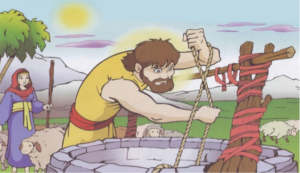 Shoaib water for a chance for some benefits, may be to get a wife out of the project. So you expected me to charge orphans money to build their wall?” Again Nabi Musa (as) realized that Allah (aj) was showing three examples that would relate to his own life. If he had the patience to endure the test and to accompany that rijal, that servant of Allah. He would have realized that these are under the actions of Allah (aj). Not only that but, greatness of Allah (aj) that those three random acts in life, had to do with his own life. To come to the realization of his own life. That’s the miraculous nature of the puzzle.
Shoaib water for a chance for some benefits, may be to get a wife out of the project. So you expected me to charge orphans money to build their wall?” Again Nabi Musa (as) realized that Allah (aj) was showing three examples that would relate to his own life. If he had the patience to endure the test and to accompany that rijal, that servant of Allah. He would have realized that these are under the actions of Allah (aj). Not only that but, greatness of Allah (aj) that those three random acts in life, had to do with his own life. To come to the realization of his own life. That’s the miraculous nature of the puzzle.
Allah (aj) says three random acts in this event; have exactly to do with your life.
- That boat was like your basket.
- That boy was like that man from Pharaoh’s army that you killed.
- That wall was like the well that you had watered, that you wanted something good to open from that because you were thirsty and tired within the dessert. From that Sayyidina Shoaib, the prophet of that time, gave his daughter to Sayyidina Musa (as).
It means all those realities were lost because couldn’t take the character to stay quiet, to stay silent, and have the best of character. Trust in Allah (aj) that he is the best of guides. He is the best of those whom will take us to the realities. But those realities are not easy to achieve. They require the best of character, best of patience and saber.
We pray that Allah (as) open more and more understanding for us. The realities are there, the holy Quran is there but, it requires a heart that is sincere. A character that is pure. And the love of Sayyidina Muhammad that dresses us and blesses us. Let that light to shine on those holy Ayaat (verses), so that it brings its noor (light) and its realities out.
Subhana rabbika rabil ‘izzati ‘ama yasifoon. Wa salamun ‘alal mursaleen wal hamdulillahi rabbil ‘alameen. Bi hurmati Muhammadil Mustafa wa bi siratil suratil Fatiha.
[Special thanks to sister Hafsa for her help with transcribing this suhbah.]
Related Articles by Mawlana Shaykh Nurjan Mirahmadi:
- Be the Moon and Follow the Sun – Even if You are Nabi Musa (as)
- You Are Your Worst Enemy Blocking All Mercy – Head is the Moon – Heart is the Sun
- Sun Source of Light; Be Like a Moon, Reflect the Light
Please Donate and support us to spread these heavenly knowledge.
Copyright © 2017 Naqshbandi Islamic Center of Vancouver, All Rights Reserved.

